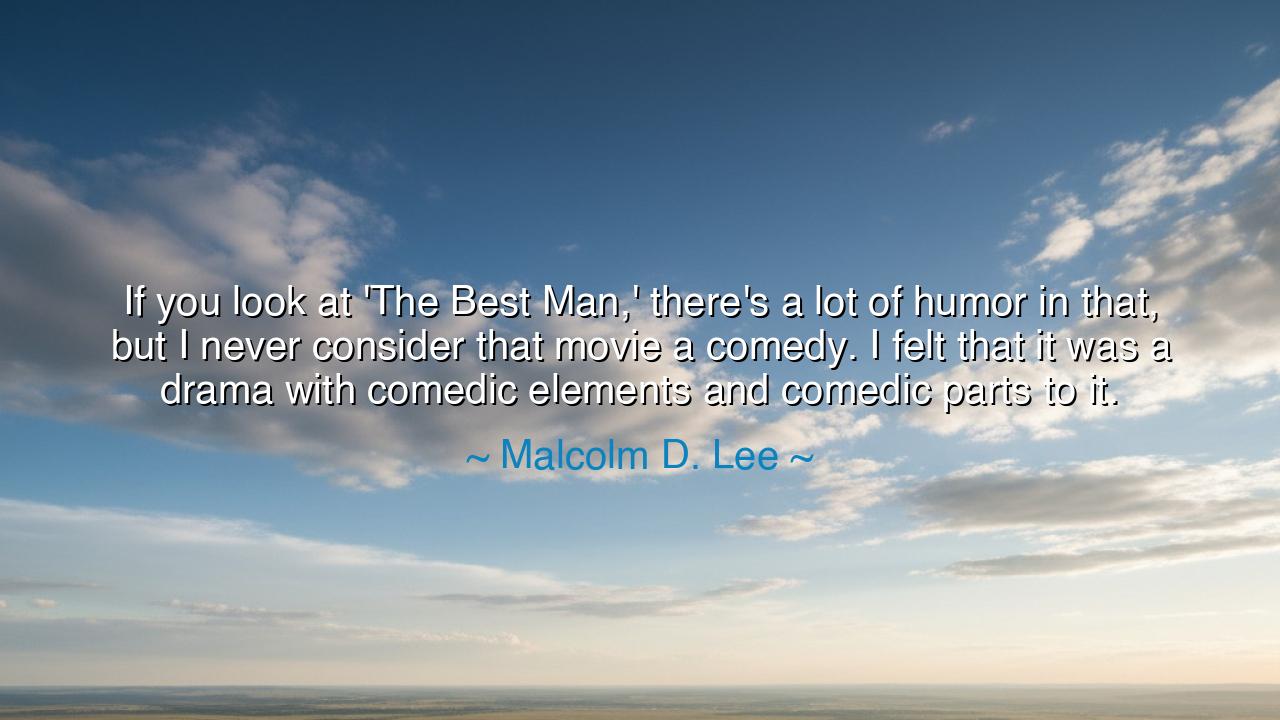
If you look at 'The Best Man,' there's a lot of humor in that
If you look at 'The Best Man,' there's a lot of humor in that, but I never consider that movie a comedy. I felt that it was a drama with comedic elements and comedic parts to it.






When Malcolm D. Lee spoke the words, “If you look at ‘The Best Man,’ there’s a lot of humor in that, but I never consider that movie a comedy. I felt that it was a drama with comedic elements and comedic parts to it,” he revealed a truth as ancient as storytelling itself—the truth that laughter and sorrow are but two notes in the same eternal song. His words remind us that life, like great art, is neither wholly joy nor wholly pain, but the dance between the two. In this quote, Lee, the creator of The Best Man, invites us to look beyond the masks of genre and see into the heart of existence itself, where humor is not an escape from struggle but a companion to it.
In the realm of the ancients, the dramatists of Greece understood this wisdom well. Sophocles and Euripides wrote tragedies that drew tears from the people, yet within those tears lived flashes of irony, of wry humor, of humanity’s ability to laugh through despair. The wise knew that laughter could rise from the ashes of sorrow, and that sometimes it was through humor that truth most clearly spoke. Thus it is with Lee’s vision: a drama with comedic elements, for such is life itself—a divine tapestry where laughter threads through heartbreak, and the soul finds balance in its ability to do both.
When Lee speaks of The Best Man not as a comedy but as a drama with humor, he is describing the nature of authentic storytelling. For to depict life truthfully is to show how people smile while standing on broken ground, how they jest in the midst of pain, how they cling to laughter as to light. In The Best Man, friends gather, love falters, trust wavers, and hearts mend—not in a farce or a fantasy, but in the full and trembling pulse of human truth. Humor does not replace grief there; it redeems it. It gives the audience breath amid the weight of feeling, just as a gasp of air saves the drowning man before he sinks again into depth.
The ancients told of Democritus, the philosopher who laughed at the follies of humankind, not out of cruelty, but out of wisdom. He was called the Laughing Philosopher because he saw in the absurdity of human striving a reflection of our shared frailty. Yet even as he laughed, he taught compassion, for he knew that to understand the world’s madness, one must first forgive it. In this way, Lee walks the same path. His laughter is not shallow—it is the laughter of understanding, born from the knowledge that life’s beauty lies in its contradictions.
To the artist, this teaching bears great weight. Do not fear to mix tones, for truth is never one color. Let your stories hold both storm and sunlight, for people do not live in endless sorrow, nor in unbroken joy. The poet who paints only happiness deceives, and the dramatist who shows only grief wounds without healing. Malcolm D. Lee’s insight reminds us that to move the heart, one must show the fullness of being, and that within every tragedy hides a flicker of laughter waiting to free us from despair.
To the listener, too, this is a sacred message. When life brings hardship, do not banish laughter; when it brings delight, do not forget its fragility. Balance these forces as the ancients balanced day and night. For humor is the soul’s rebellion against defeat—it is how the human spirit refuses to be broken. And drama, in turn, is the deep mirror of our struggle to endure. The two must live together, as yin and yang, as sunlight and shadow, for only in their unity does truth take shape.
Let this be the lesson passed down: Do not flee from the complexity of life. When you tell your story, when you live your days, let both tears and laughter dwell in your house. When sorrow visits, welcome it with dignity; when joy arrives, greet it with humility. Learn to smile through pain, and to weep through joy, for both are sacred. As Malcolm D. Lee reminds us, the truest art—and the truest life—is not bound to the label of “comedy” or “drama,” but is the harmony of both.
So walk through your days, child of time, with a heart that can laugh without forgetting the ache, and ache without losing the laughter. For this is the essence of the human story, and it is the mark of the wise to embrace it fully.






AAdministratorAdministrator
Welcome, honored guests. Please leave a comment, we will respond soon